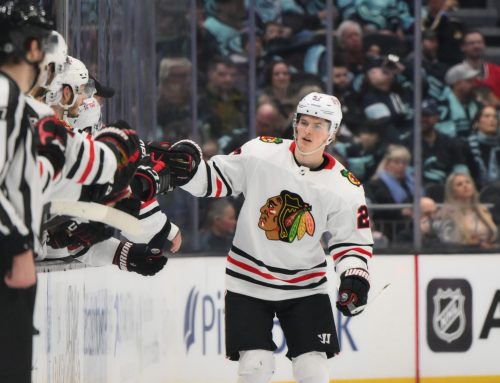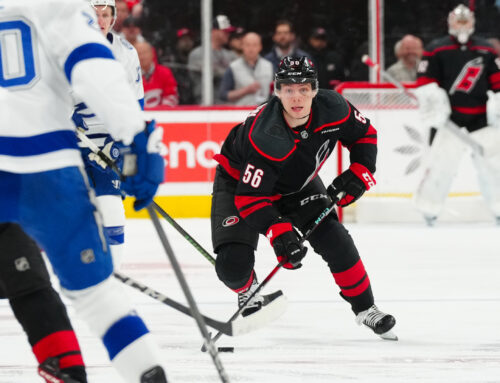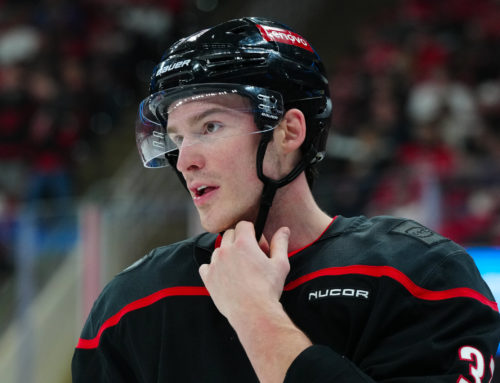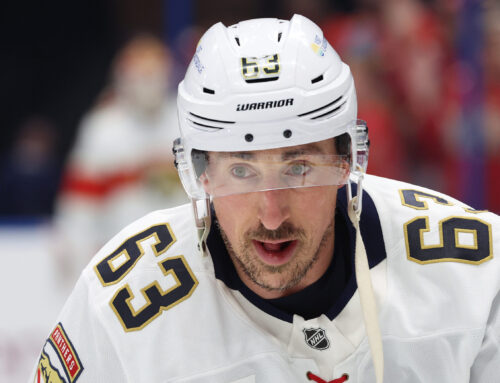
Taylor Hall, Shea Weber, P.K. Subban, and Adam Larsson all traded; thoughts on Hedman and Theodore.
****
Here we are, on the eve of the start of the NHL’s free agency period. Or as some people know it – “the offseason is almost here.”
Just a reminder on a few things:
- Offer sheet rumours are generally useless. By my research, there has been one accepted offer sheet since Chris Gratton in 1997 (Dustin Penner in 2008). Teams don’t want to anger other GMs, and with even more focus on draft picks (cheap talent), teams don’t want to give up a lot in this regard.
- Nothing is official until it’s official. There will be insinuations, innuendo, and just flat-out guesses, but until a player signs and it’s processed by the NHL, nothing is certain.
- For fantasy impact, there are a myriad of factors that are involved. Not only do new line mates matter, but even strength role, power play role, new system from a new coach, and other factors make impacts. These factors are not easy to quantify, and much may not be known until we get into training camps and exhibition games.
With all that said, grab a case of beer, some fast food, and strap in for a wild weekend. Last year, there were 31 players signed in the two days following the opening of free agency. Not everything will happen on Canada Day.
For coverage, the Dobber team will have fantasy impacts on the fantasy-relevant signings (don’t expect 500 words on Jesse Winchester) as they happen. Be sure to refresh DobberHockey regularly on throughout the weekend.
****
The writing has been on the wall for a while now – a bridge deal, benchings, the owner forcing the long-term contract to be signed – but it finally came to fruition, as P.K. Subban was traded in a 1-for-1 deal to the Nashville Predators for Shea Weber.
Dobber offered his take from a fantasy angle on this trade yesterday. You can read his article on that here.
In the press conference following the trade, Montreal GM Marc Bergevin specifically brought up how Weber could help the power play of the Habs. Well, by pure points per 60 minutes, that would be correct. By shot generation, this would be incorrect:
.png)
Subban was on the ice for more shot attempts generated relative to his teammates than Weber has over the last three years on the power play.
A year and a half ago, I wrote about the problems with Montreal’s power play setup. The team hasn’t done much since to rectify these problems. The issue with Montreal’s power play hasn’t been the personnel, it’s been the system and setup. Weber won’t fix those problems; they can only be fixed by the coaching staff.
For that reason, projecting Weber for anything more than he did last year isn’t prudent. On top of that, three of Weber’s four lowest seasons in shots per 60 minutes at five-on-five have been in the last four years (back to the start of 2007). Going to Montreal will not help in this regard, so getting Weber back to being a 220-230 shot guy isn’t realistic.
I will agree with Dobber here and say that Weber’s fantasy situation hasn’t changed much. Where I disagree with Dobber is that it hasn’t changed for Subban.
As I noted above, the Habs generated more shot attempts with Subban on the ice than with Weber, both in raw totals and relative to teammates. In general, Weber is a trigger man on the power play. He’s a booming shot from the point, and that’s a good thing to have. However, over the last two, and three, years, Subban has a higher rate of first assists per minute on the power play than Weber does. In fact, Weber consistently ranks in the bottom-third of the most-used d-men on the power play, while Subban is more middle of the pack.
Subban gives the Nashville power play an additional dimension: he can be that booming shot from the point, but he can also setup other players like James Neal or Filip Forsberg. Nashville had a top-10 power play last year in both goals and percentage, and I think this move can help get Subban to the 25-30 power play point range, rather than the 20-25 he has been for the last three years. Remember: Subban had 24 power play points in just 68 games last year.
Considering where Subban ranks in five-on-five production – the only d-men with a higher point-per-minute rate than Subban over the last four years are Karlsson, Burns, Hedman, Byfuglien, Letang, and Barrie – I think the possibility that Subban sets a career-high in points, should he remain healthy, is very real. Remember: Michel Therrien was constantly trying to reign in Subban's apparently "risky" play. I doubt the same happens in Nashville. No more puck flips to the neutral zone five times a period.
For the comparative numbers, Own The Puck is always a good place to finish:
.png)
****
The other big trade that occurred yesterday was the Oilers solidifying their defence by acquiring Adam Larsson in exchange for winger Taylor Hall.
There is no fantasy relevance for Larsson outside of depth in real-time stats leagues. Best-case scenario is he’s the next Anton Stralman. I repeat, that’s best-case. Not likely, or probable.
On the flipside, this is a huge ding to Taylor Hall. It is fair to say that Hall hasn’t been able to stay healthy so far in his career. When he does play, he is insanely productive. Think of it this way: over the last four seasons, this is the list of players to produce at a higher point rate per minute at five-on-five than Hall…
That’s it. That’s the whole list.
The problem for Hall is over the last four years, the Devils are 29th in goals for per 60 minutes, 30th in shots on goal for per 60 minutes, and 29th in shots generated per 60 minutes. This is not good for fantasy.
For that reason, I don’t think Hall can do much more than he did last year. Putting him at about 60-65 points sounds right. The Devils just play far too low-event hockey, and don’t have the surrounding talent, to really sustain any point totals that approach 80 points. Maybe this changes over the next two or three years, but it won’t change for next year.
****
Last summer during one of my Ramblings, I wrote about the decline of scoring among forwards, and the increase in scoring among defencemen. This graphic contains the pertinent information:
.png)
Again this year, goal scoring was relatively stable, coming in at 2.71 goals per team per game. For the past five seasons, the NHL average has been between 2.71 and 2.74. With that in mind, let’s update that graphic by adding last year’s numbers:
- In 2015-2016, 28 forwards scored at least 30 goals, and four forwards cracked 40 goals.
- In 2015-2016, 26 defencemen scored at least 10 goals, and 10 d-men cracked 15 goals.
The trend of declining high-end goal totals for forwards completely reversed itself, and the increasing totals of defencemen reaching double-digits stopped, and declined, as well. The question is now whether this trend continues.
My offseason research won’t really start for about another month, and the depth of the answer to that question goes far beyond the numbers presented. Allocation of ice time, very slight decline in scoring, very slight increase in power play opportunities, and just plain randomness are all factors. It is worth pondering now, though, whether the premium on high-end scoring from forwards should not be slid over to high-end scoring from defencemen. These are all questions for another day, and for now, I just want to generate some discussion on the matter.
****
With Steven Stamkos returning, and a new coach in Anaheim, I wanted to look at the past season for two different defencemen, and look into what we might be in store this season.
Shea Theodore
Theodore will be 21 years old for next season, and depending what happens with Hampus Lindholm or Cam Fowler, he could be in for a bigger role. I would caution against relying on this, though.
New Anahiem coach Randy Carlyle wasn’t exactly known during his tenure in Toronto for A) playing his young players, and B) making stellar personnel decisions. Just go back and look at the scratches from the 2013 playoff series against Boston.
In his brief stint with the team (under 20 games) Theodore did well at shot prevention, particularly for a rookie. That is basically the number-1 job for any defenceman, and while it is far from a reliable sample, it’s a good sign out of the gate. That should mean that Carlyle would like Theodore, but again, I am skeptical that he’ll be aware of this information headed into the season.
More than anything, what happens with Lindholm and Cam Fowler will be a big indicator as to how Theodore can possibly be used. Should those two return, Theodore would be no higher than the third left-handed defenceman on that team, with both Clayton Stoner and Simon Despres in the mix as well (and Despres likely ahead of him, too).
In the end, assuming at least one of Lindholm/Fowler returns for next season, Theodore is still probably no higher than the third defenceman and second pair power play. Basically, there are too many left-handed d-men for Theodore to get any significant ice time. Like last year, barring injury, I don’t see fantasy relevance in 2016-2017.
Weird, but true: Hedman has just 22 power play points over the last two seasons. Granted, in 2014-2015, he played just 59 games, but on a per-minute basis on the power play, Hedman is sandwiched between Trevor Daley and Michael Stone over those two campaigns. Hedman has never had more than 14 power play points in a season. All this seems odd. It hasn’t really hurt his overall production, though, as Hedman is eighth in points per game among all regular defencemen over the last four years (from Hockey Reference):

That production is basically why I still hold out hope that Hedman hasn’t come close to reaching his fantasy ceiling yet. His five-on-five production per minute over those four years is second in the league among d-men. If he ever gets regular usage on the top power play, and becomes a secondary or tertiary trigger-man behind Stamkos and Kucherov, a season with 20-25 power play points could push Hedman to the 60-point mark.
With Stamkos signing yesterday, it seems like the gang will be back next year. The Lightning never really got on track in the first half of the season, and have been fighting injuries to key players for a few years now. If Hedman can finally regularly take over the top PP duties, and the team stays relatively healthy, a career-year could be waiting for him.
*Stats from Hockey Reference, Hockey Analysis, and Corsica. Cap information from Cap Friendly.
12 Comments
Leave A Comment
You must be logged in to post a comment.





 CAR
CAR FLA
FLA EDM
EDM BUF
BUF TOR
TOR MTL
MTL ANA
ANA T.B
T.B NSH
NSH

“No more puck flips to the neutral zone five times a period.”
Classic stuff, Cliffy.
What a crazy and fun day yesterday, 3 massive transactions in 32 minutes!!! Terrible return for Hall, if I was an Oilers fan I would be outraged. Bad deal for the Habs to as it’s a lateral move and Subban is 4 years younger than Weber. Great deal for Tampa to keep Stamkos but I would worry about the long 8 year deal since he hasn’t been the same since his broken leg incident and blood clots can pop up again, just ask Chris Bosh and other athletes.
Subban – the chart measures teammates (relative to) but not opponents. Something to factor. I use this for my analysis: http://www.hockeyabstract.com/playerusagecharts
Keep in mind – while Subban was dancing pucks around inept Leafs, Sabres and Senators…Weber was trying to get through the Blackhawks, the Blues and the Stars.
I don’t like the Own the Puck charts for that reason, but also because they’re too arbitrary as to where they put their evaluation lines. Incredibly user friendly, thus popular with the less stats-inclined. But not always bang on and can be misleading.
For example, if you use the Player Usage Charts (part of the Dobber Sports Network links up top) you can see that Weber’s QualCom is about 1.5. Subban’s around 1.0. Weber was facing opponents on average much tougher than who Subban faced.
When you do a comparable using Own the Puck, compare Weber 2016 to Weber 2015 – it’s the same chart. He’s not fading. Compare to 2014 and you see a big jump (the Trotz effect).
Own the Puck is pretty and it’s fluffy with lots of nice frills for the average hockey fan. It can even be helpful. But I wouldn’t compare players from one conference to another (different competition faced) other than as a quick reference.
Fully agree. Especially when you’re looking at what I assume are quartiles, it’s extremely important to know the distribution upon which the standard deviation was based. That’s amplified many-fold when you’re considering two players on different teams, who play against wildly different opposing players. When you look at Weber’s corsi-relative on HERO charts, it’s not accounting for differences in QoC between him and his teammates the way usage charts do. Ideally, what you’d want is the SD for the distribution of players with comparable QoC. Then you could HERO chart him to see how his numbers stack up against others in THAT distribution.
As it stands, Weber and Josi faced BY FAR the highest QoC on their team, and played upwards of 90% of their shifts together (from Frozen Pools). Despite that, Weber’s the one with the better corsi ratings — which tells you he must perform better away from Josi than Josi does away from him (though if there were a bigger sample it’d be interesting to see their WOWY numbers).
By comparison, the QoC that Subban faced was roughly equivalent to that faced by d-men on Nashville not named Shea or Roman. In that regard, looking at a HERO comparison between Subban and Weber, where their corsi totals are compared as though they were drawn from the same sample, is EXTREMELY misleading.
Fair point on new matchups, and his division itself will be tougher overall, but now they’re swapping Leafs/Sens/Sabres for Vancouver, Arizona, Colorado, and Minnesota.And if you go back another year on Weber at OTP (to 2014), you do see how his possession numbers have cratered. For an even more stark realization of his drop-off, go back to 2012 and compare it to 2016.
Weber was all-world 4-5 years ago. He’s not anymore. He won’t be awful or anything in Montreal, but the team is worse now.
You’re looking at future (Van/ARI/COL) when my point was about the past, and why your chart looked the way it did.
Weber hasn’t lost his touch at all. That’s not me saying this – I love Subban, one of my five favorite players, and I don’t really like Weber – this is what pro scouts say. Weber is on Team Canada. One person didn’t make that call. A dozen of what we hope are our best hockey minds made that call – they want Weber, they don’t want Subban.
The team isn’t worse now. If Price gets hurt again, sure you’ll be a genius for saying that. But if Price is healthy, the team is better and they’ll be fine with Weber. Last year he faced the toughest competition on the team and almost the entire league, and outperformed Josi possession-wise.
If you look at Weber’s chart, using the chart you like, you don’t need to go back to 2012. Go to 2014, same as 2012. But that’s the Trotz effect. New coach changed all that. New coach will change that again now. Weber didn’t decline, his coaching instructions just changed.
One other point to consider – Rinne sucks now. That’ll put a dent in Subban’s CorsiRel for sure! ;)
Sorry, don’t mean to bust your balls Mike. Great Ramblings, and that wasn’t recognized ;)
Weber could indeed be a bust, one never knows. Most writers and fans think he will get 40 points and be a minus-10 while his career declines, while Subban gets 60+ points. So you’re in big company.
I took a position on Wednesday that said the Weber-Subban deal was even, and that the Hall-Larsson deal was not a fleecing. So if my own website offers a different opinion, I feel the need to reiterate my own stance to make sure newcomers know that the site offers a myriad of opinions. Months after something is written by another writer, I often get accused of writing it ;)
Keep doing what you’re doing. It’s a good thing
I’ll make you a friendly $100 bet that Larsson’s will get more than 45 points in one year within two seasons. That’s more than your best-case. In fact, I’ll give you $100 to your $50, Mike. Proceeds go to cancer?
Larsson is 23 and the only RH PP option on a McDavid team. Scary! My thinking is that he’ll surprise everyone. For me, “best case” is actually going to be a best case. As in, if he beats it you’d give up your house and bank account. Otherwise it’s a “realistic case” you’re giving. I conservatively say 60 points is best case in five years.
I want to see Weber without Josi.
Funny enough, the one NHL scout I could actually call a friend was Nashville’s scout (and now with Florida). He told me a couple of years ago that Weber really did a lot to shape Josi’s game and career. Josi owes him a lot. I agree though, Josi is now probably better
That’s cool. That D pipeline over the past 12 years is incredible.
My reaction is exactly that. Although Weber & Subban had similar TOI, PK had nearly 50% more PP time & Weber had slightly more PK time (trying to see how many acronyms I can put in one sentence). Weber had more solid partners on D, meaning that there was probably less reliance on him, while Montreal really had to lean on PK. That could definitely skew the numbers.